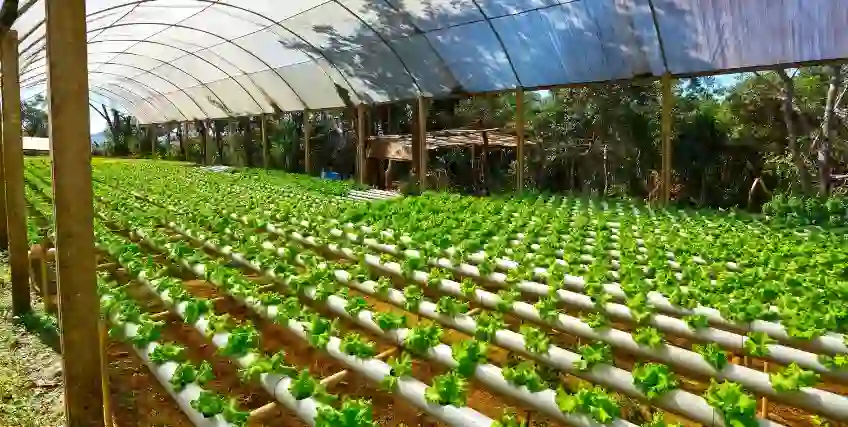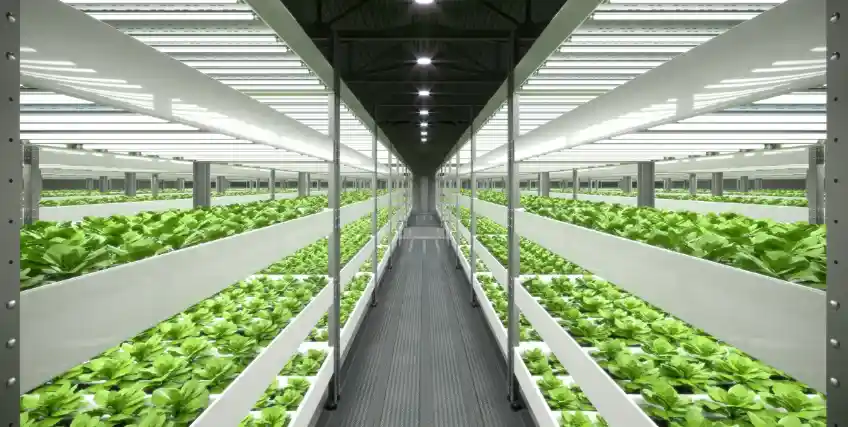Grants for Hydroponic Farming: Funding Options to Grow Your Agribusiness
Oct 07, 2025 | Last Updated on: Oct 08, 2025

Farmers today are looking for more efficient ways to grow food crops. Because of this, hydroponic farming is on the rise. Hydroponic farming is a nearly billion-dollar industry in the United States, according to IBISWorld.
Hydroponics is an ideal farming method for beginning farmers interested in urban agriculture, as it’s a space-efficient way to grow crops and supports sustainable practices.
Whether you’re new to hydroponics or already in the business, understanding funding sources is important since equipment, water systems, lighting, and technology can be costly.
Many farmers initially explore grants for hydroponic farming because they usually don’t have to be repaid. That said, not everyone who applies for a grant receives one. Thankfully, there are other funding options available, especially for those working to improve environmental quality, reduce food waste, or promote healthy food systems.
In the sections that follow, we’ll explore a few agriculture grants for hydroponic farming. We’ll also discuss small business loans you can apply for if you’re unable to secure a grant, helping you identify the best financing path for your operation.
Why Hydroponics Is the Future of Farming
The traditional farming industry faces numerous challenges, including rising costs, unpredictable weather patterns, soil erosion, and labor shortages. In addition, demand for more sustainable solutions continues to increase.
Hydroponics offers many benefits to solve some of these problems. For one, you can typically expect higher yields. You can also grow hydroponic crops year-round. Since it doesn’t depend on weather or soil quality, it works in urban areas and dry regions.
As food demand increases and weather systems become more erratic, hydroponic systems are helping solve food supply problems. These systems also support food safety by reducing the risk of contamination found in traditional soil farming.
But getting started in the hydroponic farm business isn’t cheap. A small system might cost a few thousand dollars, while a large-scale farming operation can cost hundreds of thousands of dollars.
Many private and government organizations are investing in hydroponic farming to support entrepreneurs leading the future of farming, especially urban farmers and organizations focused on local food production and green energy practices.
What are Grants and How Do They Work?
A grant is money awarded by a government agency, nonprofit, or private group for a specific purpose—and it doesn’t need to be repaid if you follow the rules. For hydroponic farming, grants can help cover costs like building systems, buying equipment, or training workers. Many focus on reducing food waste, improving access to healthy food, or supporting the environment.
Each grant has its own requirements, and applying often means writing a proposal to show how funds will be used. The process can be competitive and take weeks or months, but if approved, grant money lets you grow your hydroponics project without taking on debt.
Government Grants for Hydroponic Farming
When you're starting a hydroponic farm or want to expand an existing operation, a government grant for your operation can be helpful. There are state and federal grants to help growers cover costs such as grow lights, water filtering systems, nutrient systems, and climate control.
Available government grants for hydroponic farming can be found on the U.S. Department of Agriculture website. Note that most grant programs have application windows, that is, designated times when they accept grant proposals.
If you apply outside of the window, your application will likely not be processed and reviewed. Most also have reporting requirements regarding how you use the funds.
Below are a few available government grants for hydroponic farming:
1. USDA Specialty Crop Block Grant Program (SCBGP)
SCBGP grants are awarded to farms that produce vegetables, fruits, and other specialty crops. SCBGP grant funds can be used for:
- Food hub infrastructure support and development
- Education and nutrition studies
- Marketing proposals
- Research projects
SCBGP grants are normally awarded through individual states' departments of agriculture.
2. USDA Sustainable Agriculture Research and Education (SARE)
SARE grants for hydroponic farming focus on projects that improve sustainability in agriculture. Hydroponic growers can use a SARE grant for:
- Testing new hydroponic production systems
- Practices that improve efficiency in hydroponics
- Training support
Several grant opportunities are available through SARE, including farmer-led research and professional development activities.
3. Rural Energy for America Program (REAP)
REAP grants for hydroponic farming provide money for hydroponic farms that use renewable energy systems or those wanting to make energy-efficient improvements. REAP also offers loans that are partially guaranteed by the government.
Hydroponic farms securing a REAP grant or loan can use the funds for:
- Renewable energy systems
- Lighting
- Insulation
- Cooling and refrigeration units
- Replacing energy-efficient equipment
- High-efficiency HVAC systems
The REAP program is available for farmers and rural small businesses.
4. State and Local Grant Programs
There are many state-sponsored agriculture or clean energy grant programs. These programs usually have an easier application and proposal process, although the grant amount is usually smaller than federal government grants for hydroponic farming.
Check with your state’s Department of Agriculture to learn about grant opportunities in your state, especially if you’re an urban farmer focusing on healthy food access or local food production.
How to Apply for Grants for Hydroponic Farming
Applying for highly competitive grants will take time, some research, and patience. It’s very important to take the right steps to elevate your proposal and enhance your chances of securing a grant.
Write an Effective Business Plan
Before applying for a grant, take the time to develop a solid business plan. Explain how you would operate your farm, the types of crops you would grow, and how you would use the grant dollars. Be specific and include financial and timing projections. Also, include the amount you’re requesting.
Demonstrate Community Impact
Grants for hydroponic farming are often given to projects that impact communities. Will your hydroponic farm increase food access in underserved communities? Will it create local jobs? The more value you can show, the better.
Stay Organized
Keep a running list of deadlines, eligibility requirements, and paperwork. Most applications will require documentation like tax returns or budgets. You may also be asked to submit images or diagrams of the proposed farm site.
Start Small
Consider regional and state grants for hydroponic farming if you’re new to the grant process. Smaller grants are also less competitive. If you’re awarded a smaller grant, it could also increase your chances of getting a bigger grant or a loan down the road. If you’re not successful in getting a grant, you can also explore small business loans.
Hydroponic Farming Business Loans
Many hydroponic farmers end up going the route that other small business owners do and secure business financing. Although you have to pay back a hydroponic business loan, they're much easier to get than a grant if you have good credit and a strong business plan.
1. Term Loans
A term loan is often used by hydroponic farmers to fund large-scale expenses, including the addition of vertical farming towers and greenhouses. Term loans provide a lump sum loan disbursement that is repaid in equal monthly payments until the loan is paid off.
2. SBA 7(a) Loans
SBA 7(a) loans are a popular choice for new or growing businesses. They're backed by the Small Business Administration and issued by approved SBA lenders. You can use an SBA loan for equipment, land, working capital, and more. Loan amounts can go up to $5 million. Non-profits don’t qualify for SBA loans.
3. Government Microloans
The USDA.gov’s Farm Service Agency (FSA) offers microloans, which are a great option if you need $50,000 or less. You can use the microloan for a down payment on your farm and get another small business loan to cover other startup expenses. You can also use a microloan to repair or make improvements in your hydroponics farm operations and for water and soil conservation projects.
4. Equipment Financing
Hydroponic farming requires a lot of equipment, including LED lights and climate control, and irrigation systems. The main advantage of equipment loans is that the equipment purchased with the loan funds qualifies as collateral for the loan, so it’s often easier to qualify for. Equipment financing can help you get the equipment you need and spread out the cost over time.
5. Working Capital Loans
Working capital loans are best for short-term needs and meeting operational expenses like crop insurance, energy bills, labor costs, and other recurring farm bills. Hydroponic farming is sometimes seasonal, leading to temporary cash flow disruptions. A working capital loan can provide the capital needed so your business stays operational.
FAQs About Grants for Hydroponic Farming
1. What kind of businesses qualify for grants for hydroponic farming and hydroponic business loans?
Businesses involved in urban farming, agricultural production, aquaponics, vertical farming, horticulture, and more potentially qualify for grants for hydroponic farming, depending on the grant program.
2. Do I need to live in a rural area to qualify for hydroponics government grants?
Some grants are geared more toward rural development, but many are open to farmers in urban areas, too. Urban agriculture grants, sustainability grants, and certain USDA programs all support non-rural growers.
3. Is it okay to buy equipment with government grants for hydroponic farming?
Some grants will let you use grant funds for hydroponics equipment like grow lights, water pumps, climate control systems, and other equipment needed to set up your business. Since each grant has its own rules, it’s a good idea to read the criteria before applying.
4. How long does it take to get grants for hydroponic farming?
It depends on the grant program. The review period alone for some grants can take several months, especially if it’s a federal government grant. Smaller local or private grants might be processed faster. It’s important to apply early, meet all the requirements, and stay patient during the review period.
5. What is a small business loan?
It’s a contract between a lender and small business owner where money is borrowed and repaid over time, typically with interest to compensate the lender.
Frequent searches leading to this page
Related Articles
Government Grants for Hydroponic Farming: How to Secure Funding for Your Agri-Business
October 8, 2025
Grants for Hydroponic Farming: Funding Options to Grow Your Agribusiness
October 8, 2025
Hydroponic Farm Business Loans: The Complete Funding Options Guide
October 8, 2025




